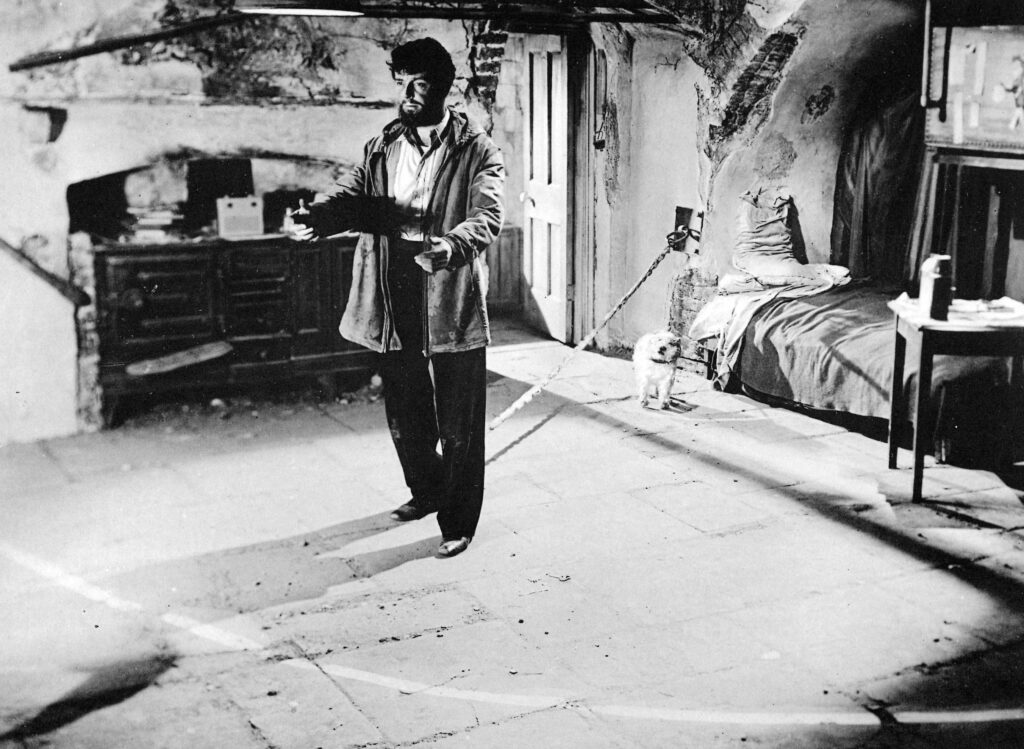‘Obsession,’ a Witty and Cunning Entertainment Seen as a Progenitor to Films Like ‘Fatal Attraction,’ Comes to Blu-Ray
The film was one of two made by director Edward Dmytryk while he was temporarily exiled from Hollywood following a run-in with the House Un-American Activities Committee.

A London-based psychiatrist and a man of some means, Clive Riordan (Robert Newton), is seated in the stuffy confines of a gentlemen’s club. He’s one of a quartet of aged gents, all of whom are stationed around a table, harrumphing about one thing or another: the quality of the liquor being served or how Canadians are incapable of speaking the King’s English. Yet Riordan is preoccupied by, of all things, hot water bottles. He persists in sketching them on a piece of scratch paper. The good doctor has something on his mind.
So begins “Obsession” (1949), a brooding British noir soon to be released by Powerhouse Films as a limited edition Blu-ray. Adapted by Alec Coppel from his own play and attendant novel “A Man About a Dog,” the screenplay is deftly tuned and set into place, a veddy British mystery of devilish mien. With not much of a budget and limited in locations — Coppel’s nearby home served as dressing room — director Edward Dmytryk crafted a witty and cunning entertainment.
Dmytryk was an American by way of British Columbia, a Hollywood journeyman who worked his way through the business from the bottom up — as messenger, then projectionist, and onto editor. He served in the latter capacity for Leo McCarey multiple times, including on pictures such as “Duck Soup” (1933), “Six of a Kind” (1934), and “Ruggles of Red Gap” (1935). Eventually, Dmytryk made it to the director’s chair.
Before he had a run of box office hits early in the 1940s, Dmytryk’s initial directorial efforts were low-budget affairs. He scored big with Ginger Rogers in “Tender Comrade” (1943) and “Murder, My Sweet” (1944), an adaptation of Raymond Chandler’s “Farewell My Lovely.” A run-in with the House Un-American Activities Committee resulted in his ouster from Hollywood: He was one of the so-called Hollywood Ten. Upon resubmitting his testimony two years later, Dmytryk was given the green light to work again in America, going on to helm impressive fare like “The Caine Mutiny” (1954) and “The Young Lions” (1959).

“Obsession” was one of two films Dmytryk made while exiled in the United Kingdom, the other being “Give Us This Day” (1949). The latter picture didn’t find much of an audience, though its critical fortunes seem to have been on the rise in recent years. “Obsession” didn’t do much better at the box office, ranking toward the bottom of the list of films from 1948. Still, the picture did receive positive notice — the Times thought it “a first-rate study in suspense and abnormal psychology” — and has subsequently been pegged as a progenitor to movies like “Dial M for Murder” (1954), “Sleuth” (1972), and “Fatal Attraction” (1987).
So, about those hot water bottles: Riordan fancies himself something of a chemist and has a makeshift laboratory in the back room of his posh medical office. He’s attempting to create a special admixture that will dissolve, if not hot water bottles, then skin and bone. You see, Riordan has had it up to here with the infidelities of his wife, Storm (Sally Gray). Catching Storm and her latest innamorata Bill Kronin (Phil Brown) unawares, the good doctor kidnaps the latter at gunpoint and keeps him chained in the basement of a nearby dilapidated building. Riordan keeps Bill supplied with day-old sandwiches, fresh martinis, and yesterday’s papers.
All the while Riordan keeps brewing his caustic potion, delivering it to the holding cell and waiting until enough has accumulated to do away with his captive. Smart enough to consider every conceivable exigency in his plan to murder and dispose of Bill, Riordan is also arrogant enough to think he’ll get away with it. Both men undergo more than a few psychological and circumstantial sticky wickets, and tensions build accordingly.
Once Scotland Yard comes sniffing around in the guise of Superintendent Finsbury (Naunton Wayne), “Obsession” becomes more conventional, more Holmes-like, in its story-telling. Only that won’t stop you from relishing Dmytryk’s spare brand of noir or, especially, Newton’s knowing performance. Never at a loss for words, even when fate conspires against him, Riordan is one of the screen’s more indelible psychopaths and the hub of a splendidly understated thriller.

